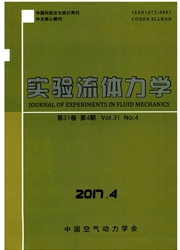

 中文摘要:
中文摘要:
以不可压流场的Bernoulli方程和势流理论为出发点详细推导了多孔探针的基本测量原理并获得了相应的数学模型,从而将具有不同头部(如球体、圆锥体)、不同孔数(如3、5、7乃至18孔)的各种类型多孔探针纳入到相同的数学模型之下,为系统分析各类探针提供了条件。通过分析推导过程,得出了多孔探针测量数学模型成立的4个基本约束条件。在实际测量过程中若偏离这4个基本条件必然会在测量结果中引入系统误差。将由此引入的系统误差分别归纳为:数学模型误差、制造误差以及使用误差,并逐个进行了详细的分析。同时,还以较为常用的七孔探针为例,采用计算流体力学软件对以上3种情况造成的误差进行了定量计算。根据以上分析和计算结果,为实际应用中选择合适类型的探针、确定使用条件、评估测量系统误差给出了详细的建议。
 英文摘要:
英文摘要:
Based on Bernoulli equation and potential theory, the mathematical model of multi- hole probe is derived, which is suitable for multi-hole probe with various shape probe head(such as spherical or conical) and hole number(such as 3,5,7, even 18 ). Four constraint conditions which ensure that the measurement model is valid are obtained. As an inevitable result of the de viation above constraint conditions the system error is brought to the measurement data. In this paper, the system error is analyzed in detail and summed up as mathematical model error, manu- facturing error and using error. Take seven-hole probe as an example, the quantitative calculation using computational fluid dynamics software is adopted to analyze the influence of the above three factors. Moreover, some detailed proposal are given on how to select appropriate probe, deter- mine the conditions of use and assess measurement system error.
 同期刊论文项目
同期刊论文项目
 同项目期刊论文
同项目期刊论文
 期刊信息
期刊信息
